Tuesday, March 8, 2022
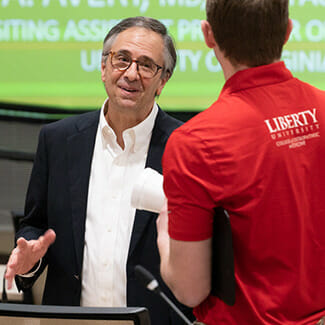
Chris Breedlove, LUCOM Marketing
At the beginning of the month, the Liberty University College of Osteopathic Medicine (LUCOM) Medical Library hosted its annual Medical Bioethics Symposium with invited guest speaker James A. Avery, MD, CMD, FAAHPM, FCCP, FACP. His presentation titled Marijuana: An Honest Look at the World’s Most Misunderstood Weed was specifically chosen as it would closely relate to the Humanities and Medical Ethics II (HME II) course for first-year student-doctors. Dr. Avery serves as the National Medical Director for Diversicare Healthcare and a Visiting Assistant Professor of Medicine at the University of Virginia’s School of Medicine. He is board-certified in internal medicine, pulmonary, Hospice and palliative medicine. He is a fellow in the American College of Physicians, American College of Chest Physicians, and the American Academy of Hospice and Palliative Medicine.
The symposium was organized by Diane Garber, assistant professor, and director of the Medical Library. “As a Christian physician, Dr. Avery was highly recommended to us for this year’s symposium, especially since his most recent book “Marijuana: An Honest Look at the World’s Most Misunderstood Weed” is of great interest in the medical community, as well as his Christian perspective on this controversial topic and its use.”
“My hope is that attendees learned to navigate through the hype surrounding marijuana use and the importance of understanding its biological components, as well as the social implications of marijuana’s legalization,” she added. “Christians need clear-headed guidance from Christian doctors and leaders because the Bible does speak against drunkenness with alcohol, and believers can apply this to avoid recreational use of marijuana. Other uses of marijuana have not yet been tested and approved by the FDA, so believers should be on guard against false claims and promises of the industry.”
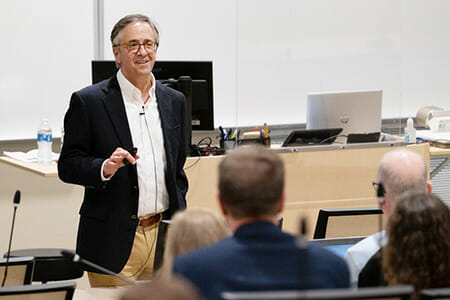
Dr. Avery started the evening symposium by saying, “People often have strong opinions about marijuana and these opinions, at times, can obscure the scientific realities. This lecture is adapted from a book I wrote in 2020 and is designed to help separate fact from opinion so that an honest understanding of marijuana will allow people to make educated choices about medical and recreational marijuana. In addition, with the robust belief that the Bible is the Word of God and that it speaks into our time and culture. As Christians, we should believe that our faith provides critical insights into the marijuana question.”
Through a detailed and informative, as well as audience-participating presentation, his educational objectives were to help those in attendance recognize and refute prevailing myths about marijuana, explain the cultural factors driving societal opinion, and provide education to the audience so they could pass on what they learned, and hopefully give a helpful direction to those in their community on understanding marijuana. “The relevance of these topics is obvious given the opioid crisis, the move to legalize marijuana, and the need for physicians to see the whole person when dealing with suffering and death,” he added.
“For me, my faith is my background, and the Bible is my final authority for faith and practice,” he said. “The Bible speaks directly into every social, cultural, and political issue — either directly or indirectly. That does not mean we, as Christians, are empowered to speak definitively about every social, cultural, or political issue as the Bible does not solve every question of policy or ethics and solid Christians can disagree. I do feel the Bible and our faith provides invaluable insights into the issue of marijuana issue.”
Marijuana, cannabis sativa, is a flowering herbaceous plant indigenous to Eastern Asia with two production components that are sought after: agricultural and pharmacological. Hemp cultivation — agricultural — requires no chemicals, pesticides, or herbicides with many industrial uses such as oil, fiber, etc. There are over 480 natural components found within the Cannabis sativa plant, of which over 70 have been classified as “cannabinoids” — chemicals unique to the Cannabis plant. These include THC, CBD, THC-V, CBN, THC-A and CBG. Tetrahydrocannabinol, THC, is a psychoactive, hallucinogenic ingredient. Cannabidiol, CBD, is not psychoactive although it appears to have a mild anti-anxiety effect and lessens the psychoactive effect and psychotic side effects of THC. With advanced manufacturing and increased productions, THC levels are now 10-30 times higher than the marijuana of the 1960s and 1970s; however, CBD levels have dropped in half over the last two decades. Higher THC and lower CBD levels mean a more rapid and intense high and ultimately, more health complications. Policy makers in the Uruguay and the Netherlands have recommended that marijuana with a THC over 15% be classified with heroin and cocaine.
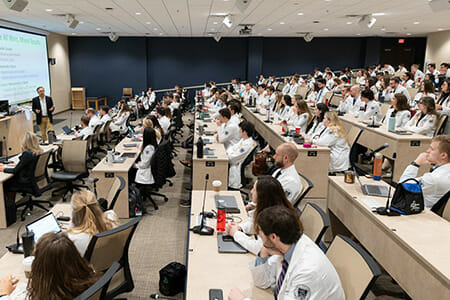
“God gave humans dominion over all the earth with instructions to subdue it. We have a mandate to use everything the Creator has given us to its fullest potential and greatest good — to God’s glory. But the fall caused man to use creation for selfish and sinful purposes,” said Dr. Avery. “With more chemistry comes more capitalism, meaning more products to consume and sell. Cannabis sativa can not only be smoked and inhaled, but it can be vaporized, act as a nasal spray, you can eat and drink it, use as a topical application and even in suppositories.”
“The U.S. public opinion on legalizing marijuana from 1969-2019 rose from 12% to 67%, and the public opinion to make marijuana illegal went down from 84% to 32%,” he added. “Powerful corporations want profit.”
Dr. Avery provided three specific areas of marijuana research: 1) FDA-approved marijuana medications of pharmaceutical-produced, quality-controlled, dose-specific medications for specific indications, 2) medical marijuana to use the whole, unprocessed plant or its extracts to treat symptoms of illness and other conditions, and 3) recreational marijuana non-medical purposes. There are very few research studies of marijuana with high THC concentrations, over 15%, and anecdotal objective observations suggest an increase in psychosis, paranoia, pain attacks, mood disorders, cardiovascular effects (tachycardia, hypertension, arrhythmias), cognitive impairment, hallucinations, and schizophrenia.
“As Christians — especially Christian healthcare workers — we have an obligation to view the body as the temple of God. Scripture tells us that wisdom comes through the counsel of many. Since physicians are a respected authority, they must strive to make all their recommendations with circumspection and wisdom,” Dr. Avery said.
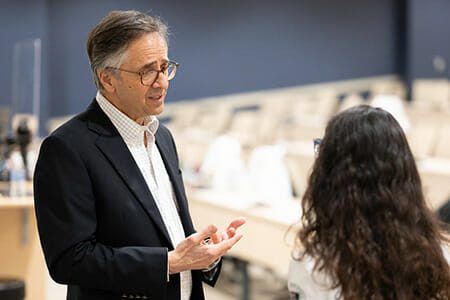
“Beware of the marijuana hype. According to a recent study, 70% of approved marijuana dispensaries in Colorado recommended marijuana to pregnant mothers experiencing morning sickness despite the medical facts such as prenatal THC expose adversely affects infant neurobehavior and child development, lower birth weight babies, and increased pregnancy complications.”
“To hit close to home; in 2021, Virginia became the 16th state to legalize recreational marijuana and the first Southern state to do so. People older than 21 can cultivate and possess limited amounts of marijuana and a commercial market will open in 2024, possibly sooner.”
With regards to recreational marijuana use in Virginia, Dr. Avery also said “Lawmakers estimate: 400 retail licenses, 60 processing/manufacturing licenses, 25 wholesale licenses with tax revenues of $31 – $62 million in the first year, and tax revenues of $154 – $308 million by the fifth year. There are perverse incentives, meaning the state will want more tax revenues thus Virginia becomes a state encouraging marijuana use and more addictions. And throughout the country, just like with alcohol, tobacco, gambling, and lottery tickets, disadvantaged minorities and the poor suffer disproportionately when marijuana becomes available.”
Dr. Avery also explained that every emergency room in every city has seen patients admitted with marijuana overdoses that included the following diagnosis’: mental impairment and distressing emotional states, paranoia, hallucinations, psychosis, cardiac arrhythmias, hypotension, heart attacks, lethargy, clumsiness, dizziness – fall injuries, and even suicidal ideation and completion.
“Marijuana is just a plant; however, today’s marijuana is a potent hallucinogenic drug. More research is needed to show the benefits that affect mankind medically. Right now, our medical experience over the past few years, if anything, has shown marijuana to be more problematic medically than we thought. The public perception of risk is dangerously at odds with the scientific data,” he added.
Concluding his presentation, Dr. Avery mentioned that the poor and disadvantaged will suffer disproportionately and that there would be continuous and increased marijuana access for teens and minors, and marijuana legalization is marijuana commercialization.
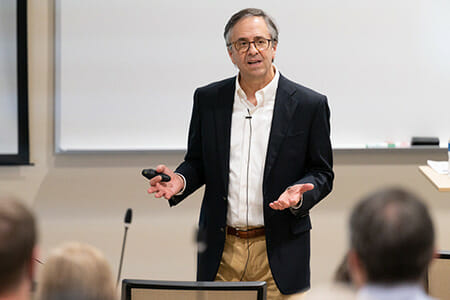
“In my opinion, FDA-approved marijuana medications should be regulated and regarded like any other FDA-approved medication. We need to encourage the legalization of marijuana via FDA approval through formal clinical scientific studies and research — not by popular vote and political lobbying. And certainly, oppose the promotion and approval of recreational and medical marijuana, even in states where it is legal, because of the profound social, health, and personal implications and the inadequate research.”
“In order to provide a role model for the community that respects Biblical principles and because of the adverse health ramifications, Christian health care professionals should abstain from using recreational or medical marijuana and advise their patients to follow their example,” he said.
The Medical Library’s Medical Bioethics Symposium is an annual event with the goal of bringing in local and statewide medical experts for topics that directly relate to the academic material student-doctors are engaged in. With regards to this year’s topic of marijuana, the intent was to combine the medical, scientific, and Christian perspective for such a controversial substance. “Christians are equipped with Scripture and a Biblical worldview to make healthy choices about marijuana or any drug. We understand that what God created for good can be distorted for evil purposes. We can be wise in instructing the next generation about the dangers of addiction to anything, and to help young people think critically about scientific evidence versus media hype and peer pressure to use something that is potentially harmful and addictive,” said Garber.